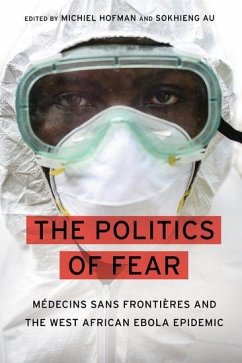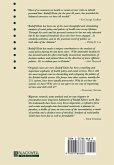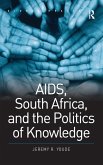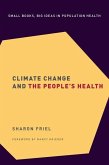The Politics of Fear
Médecins Sans Frontières and the West African Ebola Epidemic
Herausgeber: Hofman, Michiel; Au, Sokhieng
The Politics of Fear
Médecins Sans Frontières and the West African Ebola Epidemic
Herausgeber: Hofman, Michiel; Au, Sokhieng
- Gebundenes Buch
- Merkliste
- Auf die Merkliste
- Bewerten Bewerten
- Teilen
- Produkt teilen
- Produkterinnerung
- Produkterinnerung
The Politics of Fear is M¿cins sans Fronti¿s's commissioned analysis of the politics surrounding the 2014 Ebola epidemic and response. Comprising eleven topic-based chapters and four eyewitness vignettes from contributors inside and outside MSF.
Andere Kunden interessierten sich auch für
![Transcend Fear Transcend Fear]() Joseph LadapoTranscend Fear24,99 €
Joseph LadapoTranscend Fear24,99 €![The State, Politics and Health: Essays for Rudolf Klein The State, Politics and Health: Essays for Rudolf Klein]() The State, Politics and Health: Essays for Rudolf Klein152,99 €
The State, Politics and Health: Essays for Rudolf Klein152,99 €![Risky Medicine: Our Quest to Cure Fear and Uncertainty Risky Medicine: Our Quest to Cure Fear and Uncertainty]() Robert AronowitzRisky Medicine: Our Quest to Cure Fear and Uncertainty32,99 €
Robert AronowitzRisky Medicine: Our Quest to Cure Fear and Uncertainty32,99 €![Oxford Handbook of Global Health Politics Oxford Handbook of Global Health Politics]() Oxford Handbook of Global Health Politics244,99 €
Oxford Handbook of Global Health Politics244,99 €![AIDS, South Africa, and the Politics of Knowledge AIDS, South Africa, and the Politics of Knowledge]() Jeremy R YoudeAIDS, South Africa, and the Politics of Knowledge206,99 €
Jeremy R YoudeAIDS, South Africa, and the Politics of Knowledge206,99 €![Climate Change and the People's Health Climate Change and the People's Health]() Sharon FrielClimate Change and the People's Health53,99 €
Sharon FrielClimate Change and the People's Health53,99 €![The Practice of International Health The Practice of International Health]() The Practice of International Health91,99 €
The Practice of International Health91,99 €-
-
-
The Politics of Fear is M¿cins sans Fronti¿s's commissioned analysis of the politics surrounding the 2014 Ebola epidemic and response. Comprising eleven topic-based chapters and four eyewitness vignettes from contributors inside and outside MSF.
Hinweis: Dieser Artikel kann nur an eine deutsche Lieferadresse ausgeliefert werden.
Hinweis: Dieser Artikel kann nur an eine deutsche Lieferadresse ausgeliefert werden.
Produktdetails
- Produktdetails
- Verlag: Oxford University Press
- Seitenzahl: 304
- Erscheinungstermin: 2. Februar 2017
- Englisch
- Abmessung: 244mm x 164mm x 30mm
- Gewicht: 543g
- ISBN-13: 9780190624477
- ISBN-10: 0190624477
- Artikelnr.: 47864093
- Herstellerkennzeichnung
- Libri GmbH
- Europaallee 1
- 36244 Bad Hersfeld
- gpsr@libri.de
- Verlag: Oxford University Press
- Seitenzahl: 304
- Erscheinungstermin: 2. Februar 2017
- Englisch
- Abmessung: 244mm x 164mm x 30mm
- Gewicht: 543g
- ISBN-13: 9780190624477
- ISBN-10: 0190624477
- Artikelnr.: 47864093
- Herstellerkennzeichnung
- Libri GmbH
- Europaallee 1
- 36244 Bad Hersfeld
- gpsr@libri.de
Michiel Hofman worked on MSF field missions between 1993 and 1998 as Emergency Coordinator and Head of Mission in Liberia, DRC, Bosnia, Burundi, Sri Lanka, Brazil, South Sudan, and Kosovo, returning to his other career as freelance journalist between missions. Between 1999 and 2001, he co-founded the Antares Foundation, a Dutch non-profit organization that supports local NGOs in providing psycho-social support for staff working in high-stress environments. He returned to MSF in 2001 as Country Director in Russia, Operations Director in Amsterdam, and Country Director for Afghanistan. Since 2011 he has worked as senior humanitarian specialist for MSF based out of Belfast, concentrating on research, training, and operational support as well as publications in the humanitarian field. Sokhieng Au is a program staff member with the Advocacy and Analysis Unit of Médecins sans Frontières and a research fellow in the Cultural History since 1750 program at Katholieke Universiteit, Leuven, Belgium. She earned a PhD in history from University of California, Berkeley, and an MPH from the Johns Hopkins Bloomberg School of Public Health.
* Section I. Terms of Engagement
* 1. Ebola: The failure of global health governance?
* Claire Wenham
* 2. MSF and the Military
* Adia Benton
* 3. Fear and solidarity in global health: Médecins Sans Frontières and
the 2014 Ebola outbreak in West Africa
* Joao Nunes
* Section II. Systems and Actors
* 4. Between mistrust and routine: epidemic management in Guinea, Mali,
and Niger
* Jean-François Caremel
* 5. Roll out of and response to the epidemic: Impressions from the
field perspective
* Thomas Kratz
* 6. Collateral effects of Ebola virus disease on the national health
programs in Guinea, 2014
* Niouma Nestor Leno
* Section III. Therapeutics
* 7. Unproven humanitarian assistance: MSF and the ethics of using
experimental vaccines and treatments during the Ebola epidemic
* Annette Rid
* 8. Z-Mapp for white people only
* Timothy O'Dempsey
* 9. Balancing patient care, epidemic containment, and risks of staff
contamination
* Armand Sprecher
* Section IV. (Im)mobility
* 10. Care or containment? Field practices and perceptions of norms for
contact follow up
* Alice Desclaux, Stéphane Doyon, Khoudia Sow, and Almudena Mari Saez
* 11. Challenges of Instituting Effective 'Medevac' Policies
* Duncan McLean
* 1. Ebola: The failure of global health governance?
* Claire Wenham
* 2. MSF and the Military
* Adia Benton
* 3. Fear and solidarity in global health: Médecins Sans Frontières and
the 2014 Ebola outbreak in West Africa
* Joao Nunes
* Section II. Systems and Actors
* 4. Between mistrust and routine: epidemic management in Guinea, Mali,
and Niger
* Jean-François Caremel
* 5. Roll out of and response to the epidemic: Impressions from the
field perspective
* Thomas Kratz
* 6. Collateral effects of Ebola virus disease on the national health
programs in Guinea, 2014
* Niouma Nestor Leno
* Section III. Therapeutics
* 7. Unproven humanitarian assistance: MSF and the ethics of using
experimental vaccines and treatments during the Ebola epidemic
* Annette Rid
* 8. Z-Mapp for white people only
* Timothy O'Dempsey
* 9. Balancing patient care, epidemic containment, and risks of staff
contamination
* Armand Sprecher
* Section IV. (Im)mobility
* 10. Care or containment? Field practices and perceptions of norms for
contact follow up
* Alice Desclaux, Stéphane Doyon, Khoudia Sow, and Almudena Mari Saez
* 11. Challenges of Instituting Effective 'Medevac' Policies
* Duncan McLean
* Section I. Terms of Engagement
* 1. Ebola: The failure of global health governance?
* Claire Wenham
* 2. MSF and the Military
* Adia Benton
* 3. Fear and solidarity in global health: Médecins Sans Frontières and
the 2014 Ebola outbreak in West Africa
* Joao Nunes
* Section II. Systems and Actors
* 4. Between mistrust and routine: epidemic management in Guinea, Mali,
and Niger
* Jean-François Caremel
* 5. Roll out of and response to the epidemic: Impressions from the
field perspective
* Thomas Kratz
* 6. Collateral effects of Ebola virus disease on the national health
programs in Guinea, 2014
* Niouma Nestor Leno
* Section III. Therapeutics
* 7. Unproven humanitarian assistance: MSF and the ethics of using
experimental vaccines and treatments during the Ebola epidemic
* Annette Rid
* 8. Z-Mapp for white people only
* Timothy O'Dempsey
* 9. Balancing patient care, epidemic containment, and risks of staff
contamination
* Armand Sprecher
* Section IV. (Im)mobility
* 10. Care or containment? Field practices and perceptions of norms for
contact follow up
* Alice Desclaux, Stéphane Doyon, Khoudia Sow, and Almudena Mari Saez
* 11. Challenges of Instituting Effective 'Medevac' Policies
* Duncan McLean
* 1. Ebola: The failure of global health governance?
* Claire Wenham
* 2. MSF and the Military
* Adia Benton
* 3. Fear and solidarity in global health: Médecins Sans Frontières and
the 2014 Ebola outbreak in West Africa
* Joao Nunes
* Section II. Systems and Actors
* 4. Between mistrust and routine: epidemic management in Guinea, Mali,
and Niger
* Jean-François Caremel
* 5. Roll out of and response to the epidemic: Impressions from the
field perspective
* Thomas Kratz
* 6. Collateral effects of Ebola virus disease on the national health
programs in Guinea, 2014
* Niouma Nestor Leno
* Section III. Therapeutics
* 7. Unproven humanitarian assistance: MSF and the ethics of using
experimental vaccines and treatments during the Ebola epidemic
* Annette Rid
* 8. Z-Mapp for white people only
* Timothy O'Dempsey
* 9. Balancing patient care, epidemic containment, and risks of staff
contamination
* Armand Sprecher
* Section IV. (Im)mobility
* 10. Care or containment? Field practices and perceptions of norms for
contact follow up
* Alice Desclaux, Stéphane Doyon, Khoudia Sow, and Almudena Mari Saez
* 11. Challenges of Instituting Effective 'Medevac' Policies
* Duncan McLean








